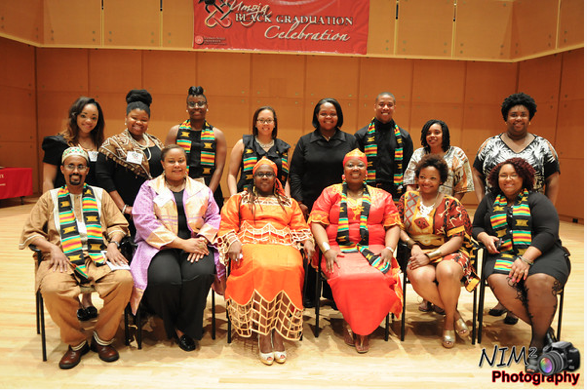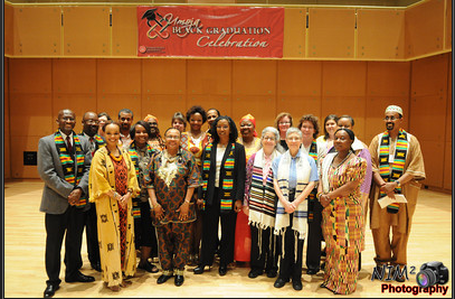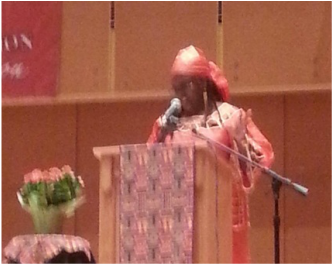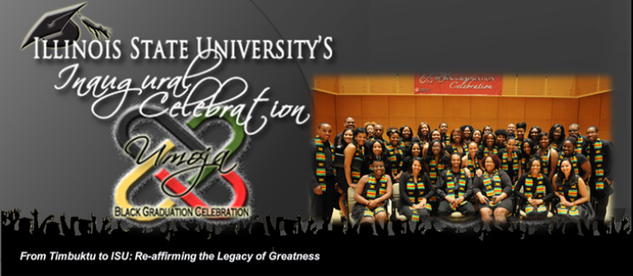LIST OF CONTRIBUTORS
UMOJA STEERING COMMITTEE 2013
Dua baako gye mframa a εbu |
COMMITTEE ORGANIZATION REPRESENTATION
|
HARAMBEE CIRCLE OF CULTURE
Gold Sponsors
|
Dr. Amelia Adkins
Dr. Lee Brasseur Jeffrey Brumfield Dr. Becca Chase Dr. Ricardo Cruz John Davenport Dr. Venus Evans Winters Linda Foster Dr. Diane Gardner Dr. Angela Haas Dr. Elaine Hardy Dr. Duriel E. Harris Dr. Beth Hatt Dr. Kristina Hesbol Shawn Hitchcock Dr. Pamela Twyman Hoff |
Aja Holmes
Dr. Doris Houston Dr. Julie Jung Dr. Lydia Kyei-Blankson Dr. Karla Martin Dr. Phyllis McCluskey-Titus Dr. Mohamed Nur-Awaleh Dr. Stacy Otto Dr. Paula Ressler Flourice Richardson Lindsay Vahl Daphyne Walker Doni Walker Janessa Williams Tuwana Wingfield |
|
|
SILVER SPONSORSThe Office of the President
The Graduate School Graduate Programs in English Studies |
COMMUNITY SPONSORSISU Black Colleague Association
Association of Black Academic Employees at ISU Bloomington/Normal NAACP Cultural Career Network Program (CCNP) Diversity Advocacy (DOS) |
SPECIAL THANKS
|
Interdenominational Youth Choir
A.B.L.A.Z.E. (Abiding, Believing, and Living Actively as Zealous Examples) Dance Ministry Dr. A. Oforiwaa Aduonum Kayodi Ajayi Umoja African Dance & Drum Group Dancers: Muriel Dorsey Drummers: William Shaw Kendrea Dudley Cameron Wilson Krystal Barnes Host of Volunteers and Friends of the Community |
The audacity of people to celebrate difference by Ariana M. Taylor, Columnist Vidette Online April 28, 2013
|
INAUGUAL UMOJA CELEBRATION THEME
FROM TIMBUKTU TO ISU:
REAFFIRMING THE LEGACY OF GREATNESS
INAUGURAL KEYNOTE SPEAKER
| |||||||
| 2013 Umoja Celebration Program | |
| File Size: | 844 kb |
| File Type: | |
CULTURAL RELEVANCE
The Illinois State University (ISU) Umjoa: Black Graduation Celebration was born from the hearts and minds of African American students, faculty, alumni and staff. It arose from a desire to acknowledge and celebrate the unique educational challenges, experiences, struggles and successes of students within the context of African and African-American culture. Within this cultural context, the event serves individual, group and socio-cultural purposes. Primarily, the event seeks to create a unique and culturally rich space that celebrates the successful completion and the awarding of degrees to graduates with the support of and their families, faculty and staff.
In addition, the event serves as unifying symbol of perseverance in the recognition of a shared socio-cultural, political and educational history. Conceptualized within the African American tradition of transformative resistance, the event seeks to foster and extend dialogues that promote self-determination as it relates to retention. Finally, the event seeks to expand and ignite a counter narrative that disrupts the prevalence of deficit thinking and theorizing in education.
Within the context of these critical purposes the theme fromTimbuktu to ISU: Reaffirming the Legacy of Greatness emerged. Timbuktu, an intellectual center was a part of the Western Sudanic Civilizations. The Western Sudanic Civilizations of Ghana, Mali and Songhai, situated on the west coast of Africa, were characterized by stability and similarity (Karenga, 2002). In this educational context, the great civilization of Mali provides historical significance and inspiration.
The Mali empire rose from the disintegrated Ghanaian Empire, and its first named emperor was Sundiata who ruled from approximately 1230 until 1255. His control of the trans-Saharan trade eliminated his enemies, and brought wealth to the country. Without wars Sundiata focused his attention on the development of agriculture.
This focus established Mali as one of the richest agricultural areas in West Africa (Karenga, 2002). Perhaps the most well-known emperor of the Malian empire was Mansa Musa. From 1312 until 1332 Musa reigned as the Malian emperor expanding and growing the populous to approximately 10 million. His contribution to the development of African civilization was solidified in his building of University of Sankore at Timbuktu. Timbuktu became an intellectual epicenter that attracted students and scholars from around the world. Even when the Malian empire began to decline its legacy laid the foundation for recognition and respect for Africa below the Sahara during its time.
In the 1400s the Malian Empire began its decline, as the Songhai Empire rose to establish its powerful legacy. Askia Muhammad, marked in history as Askia
the Great built the largest empire in West and Central Africa. His best known achievements are in the areas of intellectual development. He developed universities in Gao, Jenne and Timbuktu wherein which subjects such as literature, math, science, biology and grammar were taught. Students and scholars from Asia, parts of Africa, Europe and the Muslim world studied at the university.
It is from this legacy of intellectual development that the event, the Umjoa: Black Graduation Celebration draws its cultural fervor. The event is an acknowledgement of this history and seeks to re-vitalize and re-affirm graduates, current students and future students of a lineage of academic achievement and social transformation.
In addition, the event serves as unifying symbol of perseverance in the recognition of a shared socio-cultural, political and educational history. Conceptualized within the African American tradition of transformative resistance, the event seeks to foster and extend dialogues that promote self-determination as it relates to retention. Finally, the event seeks to expand and ignite a counter narrative that disrupts the prevalence of deficit thinking and theorizing in education.
Within the context of these critical purposes the theme fromTimbuktu to ISU: Reaffirming the Legacy of Greatness emerged. Timbuktu, an intellectual center was a part of the Western Sudanic Civilizations. The Western Sudanic Civilizations of Ghana, Mali and Songhai, situated on the west coast of Africa, were characterized by stability and similarity (Karenga, 2002). In this educational context, the great civilization of Mali provides historical significance and inspiration.
The Mali empire rose from the disintegrated Ghanaian Empire, and its first named emperor was Sundiata who ruled from approximately 1230 until 1255. His control of the trans-Saharan trade eliminated his enemies, and brought wealth to the country. Without wars Sundiata focused his attention on the development of agriculture.
This focus established Mali as one of the richest agricultural areas in West Africa (Karenga, 2002). Perhaps the most well-known emperor of the Malian empire was Mansa Musa. From 1312 until 1332 Musa reigned as the Malian emperor expanding and growing the populous to approximately 10 million. His contribution to the development of African civilization was solidified in his building of University of Sankore at Timbuktu. Timbuktu became an intellectual epicenter that attracted students and scholars from around the world. Even when the Malian empire began to decline its legacy laid the foundation for recognition and respect for Africa below the Sahara during its time.
In the 1400s the Malian Empire began its decline, as the Songhai Empire rose to establish its powerful legacy. Askia Muhammad, marked in history as Askia
the Great built the largest empire in West and Central Africa. His best known achievements are in the areas of intellectual development. He developed universities in Gao, Jenne and Timbuktu wherein which subjects such as literature, math, science, biology and grammar were taught. Students and scholars from Asia, parts of Africa, Europe and the Muslim world studied at the university.
It is from this legacy of intellectual development that the event, the Umjoa: Black Graduation Celebration draws its cultural fervor. The event is an acknowledgement of this history and seeks to re-vitalize and re-affirm graduates, current students and future students of a lineage of academic achievement and social transformation.
INAUGURAL CLASS OF 2013
UNDERGRADUATES
|
Ngozi Agomo
Brittni Anderson Dominique Arrington Dion Banister Anthony Bowers Lauren Bradley Courtney Brooks Karyn Burns Aaron Cooper Alexis Curington Monique Davis |
Brooke Greenwood
Monica Hamilton Dominique Harris Rachel Hawkins Michaura Hill Nichelle Howard Cari Johnson Ebony Johnson Danielle King Kimberly King Vania Lott |
Nicholas Malvin
LaCrisha McAllister Candice Moore Paris Porter Larry Quinn Christa Shavers Raven Smith O'Cephus Starks Brandon Stevens Samantha Stewart |
Emmia Sykes
Ariana Taylor Angelica Taylor Gabrielle Thomas David Walker Jamere Walton Chardai Washington Rachel Watkins Zakiya Williams Ebony Withers |
GRADUATESSenesta Davis
Vance GodBold Katrina Jackson Janelle Love Helen Woldemichael |
|
|
|
Read article by Veronica Wells (June 12, 2012)
LOUD CHEERS, NO ARRESTS & CULTURAL CELEBRATION: THE NEED FOR BLACK GRADUATION CEREMONIES |
|




